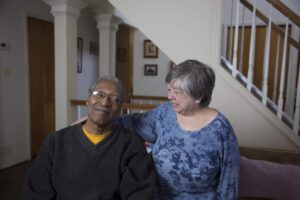Losing a loved one is an experience that no one can truly prepare for. The grief and emotional upheaval that accompany such a loss can be overwhelming. During this difficult time, it’s essential to know what practical steps to take to ensure that you can focus on healing and honoring the memory of your loved one. While each person’s journey is unique, this blog post aims to provide a general guide to help you navigate the immediate aftermath of a loved one’s death.
What to Do Immediately After Someone Dies:
When someone close to us dies, it is essential to have a clear understanding of what needs to be done immediately in order to ensure that their final wishes are honored, legal obligations are met, and that the grieving process can begin with as few complications as possible. First and foremost, be sure to get a legal pronouncement of death and notify close friends and family.
- Get a legal pronouncement of death. The first thing to do when someone dies is get a legal pronouncement of death. If the person died in a hospital or nursing home, the staff there will handle this. “An official declaration of death is the first step to getting a death certificate, a critical piece of paperwork. But if the person died at home, especially if it was unexpected, you’ll need to get a medical professional to declare them dead. To do this, call 911 soon after they die and have the person transported to an emergency room where they can be declared dead and moved to a funeral home. If the person died at home under hospice care, a hospice nurse can declare them dead. Without a declaration of death, you can’t plan a funeral, much less handle the deceased’s legal affairs” (AARP, 2020).
- Obtain multiple (about 5-10) original copies of the Death Certificate. Some entities will accept copies, but others will require originals so it’s helpful to have plenty of originals on hand. In Vermont, records may be obtained from any City or Town running the Vital Records Issuance Management System (VRIMS).
- Notify family and friends. Notify contacts in the deceased person’s phone and email account and recruit family members or friends to help you spread the word. You can also choose to post on social media.
- Notify the deceased person’s employer, educational establishment, and/or place of worship.
- Contact any clubs, membership organizations, and social groups.
- Recruit someone to write and submit the obituary.
- Make funeral and burial arrangements. Search the paperwork to find out if there was a prepaid burial plan or pre-made funeral arrangements. Decide whether you want a funeral, viewing hours, a memorial service, cremation, and whether to buy a casket or urn.
- If the individual was a Veteran, contact the Veterans Administration to see if they offer burial benefits or funeral services.
- Funeral arrangements. Make a plan for pallbearers, eulogy, music, plan service, location, and tombstone. Recruit help for a luncheon or gathering of family afterward.
- Go through the deceased person’s mail, cancel subscriptions, and pay any remaining bills. To get assistance with the deceased’s finances, contact Legal Aid at 1-800-889-2047 or refer to Age Well’s Elder Law Attorney List.
- Find the will and executor. If there is none, the probate court will appoint an administrator to inventory assets, divide up assets and distribute among the remaining family. The probate process ensures that the deceased has paid all debts and ensures remaining assets are distributed among the beneficiaries.
- The executor of the estate should choose an estate attorney.
- Prevent identity theft. Send a death certificate to one of the three credit bureaus: Equifax, Experian, or TransUnion. If you tell one, it’s as good as telling all of them. Close any credit card accounts or have the deceased person’s name removed from the account to prevent identity theft. Learn more: https://www.experian.com/blogs/ask-experian/credit-education/faqs/experian-document-upload-service/
- Cancel the deceased person’s driver’s license at the DMV. This removes the deceased’s name from the records of the department of motor vehicles and prevents identity theft. Contact the agency for specific instructions, but you’ll need a copy of the death certificate. Keep a copy of the canceled driver’s license in your records. You may need it to close or access accounts that belonged to the deceased.
- Close any email accounts. If you do not have access to their accounts, you will likely need to contact the company’s support team.
Who Needs to Be Notified When Someone Dies?
After someone dies, there is a wide array of organizations that need to be notified in addition to family, friends, and social groups. The process of notifying those who need to be informed involves a careful and considerate approach, as it not only ensures that the deceased’s affairs are managed correctly but also provides support to those affected by the loss.
- Notify health professionals. Cancel any remaining appointments for medical, dental, and other health-related appointments.
- Notify Social Service agencies that were involved in their care. Including but not limited to: respite providers, Meals on Wheels, adult day programs, etc. If they received 3SquaresVT, contact the Economic Services Division (ESD) at 1-800-479-6151.
- Notify Social Security. The agency will contact Medicare and notify them. The Burlington Social Security office is located at 128 Lakeside Avenue, Suite 107, Burlington or call 1-877-840-5776.
- Notify pension providers. They will want to see a death certificate. Don’t wait to do this, providers may seek to claw-back pension payments made after the date of death.
- Notify property and utilities. Including: home mortgage provider, cable, internet, gas, phone, electric, oil/propane/fuel, water. If renting, inform the landlord, housing authority, or housing association.
- If the deceased person used an accountant, notify them. They may need to file a final tax return on the estate.
- Notify any life insurance companies. They will ask for the death certificate and will want policy numbers.
- Notify banks and financial institutions. They may want to see a death certificate.
- Notify Government offices. Town clerk/election office, tax office, disabled parking permits, library membership, DMV, passport agency, post office (stop or forward mail), and police station (if deceased held a firearms license).
- Contact health insurance and auto insurance providers to end coverage. Ask that any unused premium be refunded.
- Contact social media providers. Shut down accounts or convert to Memorial accounts.
Losing a loved one is undeniably one of life’s most profound and challenging experiences. While the grief journey is unique to each individual, following these steps can help you navigate the practical and emotional aspects that arise after a loved one’s death.
Remember, there is no set timeline for healing, and it’s important to allow yourself the space and support needed to mourn, cherish memories, and find solace. Reach out for help when needed.
Age Well can assist you to navigate these steps and help answer your questions, call the Helpline at 1-800-642-5119.
Sources:


